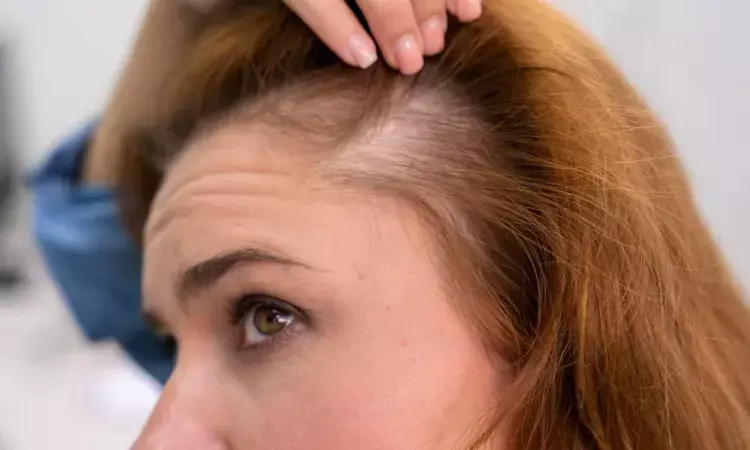- Home
- Medical news & Guidelines
- Anesthesiology
- Cardiology and CTVS
- Critical Care
- Dentistry
- Dermatology
- Diabetes and Endocrinology
- ENT
- Gastroenterology
- Medicine
- Nephrology
- Neurology
- Obstretics-Gynaecology
- Oncology
- Ophthalmology
- Orthopaedics
- Pediatrics-Neonatology
- Psychiatry
- Pulmonology
- Radiology
- Surgery
- Urology
- Laboratory Medicine
- Diet
- Nursing
- Paramedical
- Physiotherapy
- Health news
- Fact Check
- Bone Health Fact Check
- Brain Health Fact Check
- Cancer Related Fact Check
- Child Care Fact Check
- Dental and oral health fact check
- Diabetes and metabolic health fact check
- Diet and Nutrition Fact Check
- Eye and ENT Care Fact Check
- Fitness fact check
- Gut health fact check
- Heart health fact check
- Kidney health fact check
- Medical education fact check
- Men's health fact check
- Respiratory fact check
- Skin and hair care fact check
- Vaccine and Immunization fact check
- Women's health fact check
- AYUSH
- State News
- Andaman and Nicobar Islands
- Andhra Pradesh
- Arunachal Pradesh
- Assam
- Bihar
- Chandigarh
- Chattisgarh
- Dadra and Nagar Haveli
- Daman and Diu
- Delhi
- Goa
- Gujarat
- Haryana
- Himachal Pradesh
- Jammu & Kashmir
- Jharkhand
- Karnataka
- Kerala
- Ladakh
- Lakshadweep
- Madhya Pradesh
- Maharashtra
- Manipur
- Meghalaya
- Mizoram
- Nagaland
- Odisha
- Puducherry
- Punjab
- Rajasthan
- Sikkim
- Tamil Nadu
- Telangana
- Tripura
- Uttar Pradesh
- Uttrakhand
- West Bengal
- Medical Education
- Industry
Luteolin, an antioxidant in vegetables, may contribute to the prevention of hair graying: Study

Graying hair is a hallmark of aging, often considered an inevitable part of growing older. However, recent research from Nagoya University in Japan led by Masashi Kato and Takumi Kagawa suggests that an antioxidant might suppress this process. The researchers identified luteolin, an antioxidant found in vegetables including celery, broccoli, carrots, onions, and peppers, as being a potential anti-graying agent. Their findings pave the way for potential applications in human hair care.
The researcher’s study focused on three antioxidants-luteolin, hesperetin, and diosmetin-to assess their anti-graying effects in mice that were bred to go gray like humans. The difference was startling, the mice that received luteolin retained their black fur, even as their cage mates' fur turned gray, regardless of whether the luteolin was given externally or internally.
“This result was surprising,” Professor Kato said. “While we expected that antioxidants may also have anti-graying effects, only luteolin, not hesperetin or diosmetin, demonstrated significant effects. This finding suggests that luteolin may have a unique medicinal effect that prevents graying.”
Luteolin's anti-graying effects are closely linked to its influence on endothelins-proteins that play a crucial role in cellular communication. In the study, luteolin treatments preserved the expression of endothelins and their receptor. This preservation supports healthy signaling pathways, preventing the decline in melanocyte activity that typically accompanies graying.
“Interestingly, luteolin had limited effects on hair cycles, indicating that its primary impact is on pigmentation rather than hair growth or shedding,” Professor Kato said. “This targeted action makes luteolin a particularly intriguing candidate for addressing age-related hair graying.”
The similarities between the hair graying processes in the model mice and humans offer encouraging prospects for translating these findings into human applications. As well as vegetables, luteolin is already available as a supplement for topical and oral use, making it a viable candidate for further development as an anti-graying treatment. As research progresses, this antioxidant could become a key ingredient in hair care regimens, helping individuals preserve their natural hair color as they age.
Building on these promising results, Dr. Kagawa envisions broader applications for luteolin in age-related research. “It would be interesting to investigate whether luteolin's anti-aging effects could also be applicable to other age-related changes, including balding.”
Reference:
Iida, M.; Kagawa, T.; Yajima, I.; Harusato, A.; Tazaki, A.; Nishadhi, D.A.S.M.; Taguchi, N.; Kato, M. Anti-Graying Effects of External and Internal Treatments with Luteolin on Hair in Model Mice. Antioxidants 2024, 13, 1549. https://doi.org/10.3390/antiox13121549
Dr Kamal Kant Kohli-MBBS, DTCD- a chest specialist with more than 30 years of practice and a flair for writing clinical articles, Dr Kamal Kant Kohli joined Medical Dialogues as a Chief Editor of Medical News. Besides writing articles, as an editor, he proofreads and verifies all the medical content published on Medical Dialogues including those coming from journals, studies,medical conferences,guidelines etc. Email: drkohli@medicaldialogues.in. Contact no. 011-43720751


